6 most important nutrients for immune health
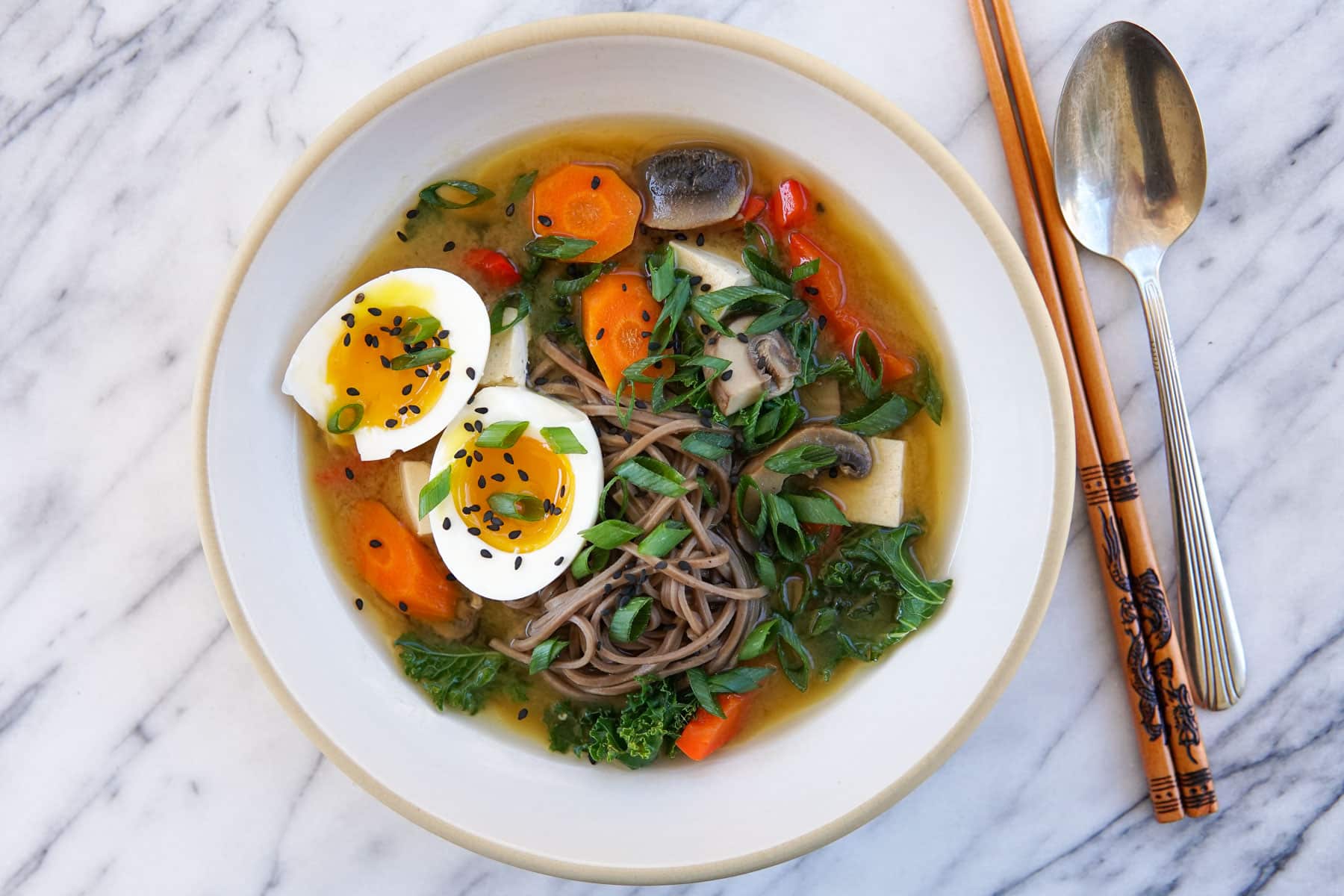
It’s that time of year with back to school and cooler temps that cold/flu season begins. That’s why it’s super important to boost your immune systems now so we can have a strong foundation to help fight off and reduce the severity of any future infections or illnesses. So let’s dive into some of the […]
It’s that time of year with back to school and cooler temps that cold/flu season begins. That’s why it’s super important to boost your immune systems now so we can have a strong foundation to help fight off and reduce the severity of any future infections or illnesses.
So let’s dive into some of the most important nutrients for immune health and where you can find them!
Vitamin A
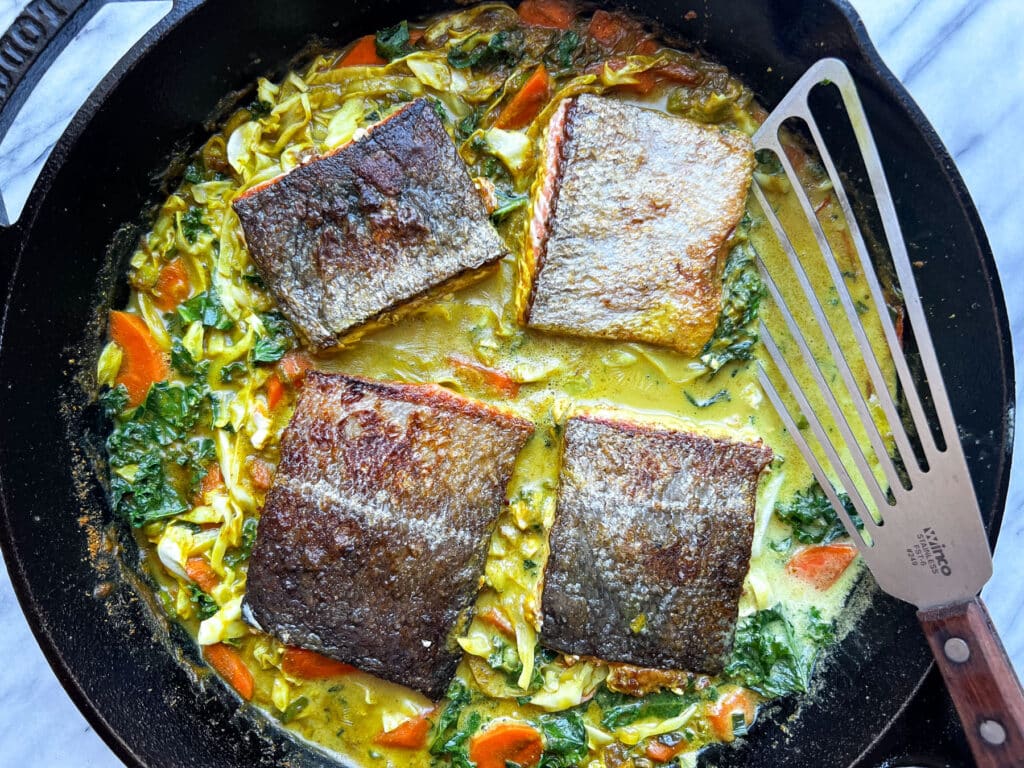
This immune-boosting fat-soluble vitamin acts as an antiviral by making our cell walls stronger against potential viral infection. It’s needed to produce anti-bacterial enzymes important for immune function.
You can get vitamin A through animal sources (retinol) and plant sources (carotenoids), though it is more bioavailable through animal sources. (1)
Sources:
- Fatty fish
- Eggs
- Liver
- Full-fat milk and cheese
- Sweet potatoes, carrots, winter squash
- Leafy greens (kale, spinach, chard, collards, broccoli)
- Red bell peppers
- Cantaloupe
- Mango
Vitamin A-rich recipes:
- Cheesy Frozen Veggie Egg Bake
- Curry Lentil Carrot Soup with Sunflower Cream
- Skillet Salmon Coconut Curry
- Sheet Pan Salmon Kale Salad with Miso Ginger Dressing
- Mango Rainbow Crunch Salad
- Curried Lentil Sweet Potato and Greens Soup with Lime Yogurt
- Sweet Potato Citrus Smoothie
Vitamin C
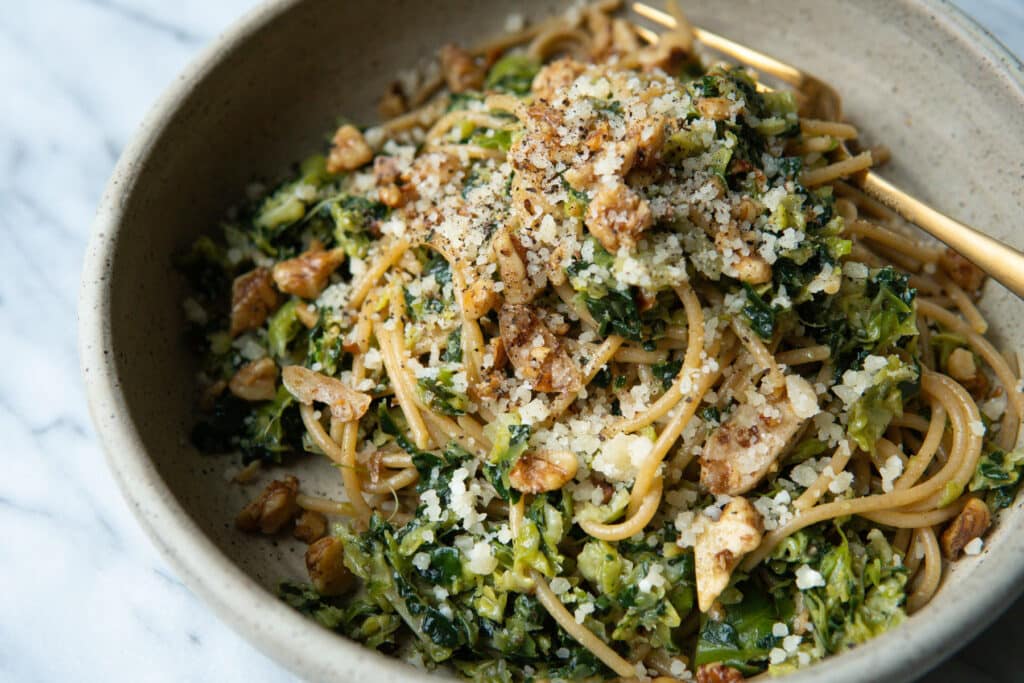
Having this vitamin on board protects you against infections through its strong antimicrobial properties. It may not prevent you from getting an infection (like a cold or flu), but it may reduce the length and severity of that cold. It’s also a strong antioxidant that plays a huge role in wound healing and the health of our skin and connective tissue. (2)
Sources
- Red and yellow bell peppers
- Broccoli
- Brussels sprouts
- Leafy greens
- Parsley
- Cabbage
- Cauliflower
- Oranges
- Strawberries
- Tomatoes
Vitamin C-rich recipes:
- Feel Better Miso Noodle Soup
- Creamy Lentil Tomato Soup with Parmesan Toast
- Orange Mango Creamsicle Smoothie
- Garlicky Brussels Sprout Kale Spaghetti
- Rainbow Rice Bowls with Spicy Curry Peanut Sauce
- Roasted Cabbage Meatball Bowls with Creamy Ricotta Dressing
Vitamin D

Having adequate levels of this fat-soluble vitamin (which is actually a hormone) is super important for immune health. It’s needed to activate our infection fighting white blood cells (T cells) and enzymes involved in the immune response. Having low vitamin D levels is strongly associated with a weakened immune system. While it can be found in small amounts in certain foods, we get most of our vitamin D by converting sunlight into vitamin D through our skin (3).
Vitamin D is one of the few supplements I take because it’s so hard to get from food. This is my favorite!
Sources:
- Fatty fish
- Egg yolk
- Mushrooms (that were grown in sunlight)
- Enriched cereal
- Supplements
Vitamin D-rich recipes:
- Roasted Salmon and Cabbage with Pear + Miso
- Easy Veggie Breakfast Bowls
- Eggs n’ Greens Anytime Skillet
Vitamin E
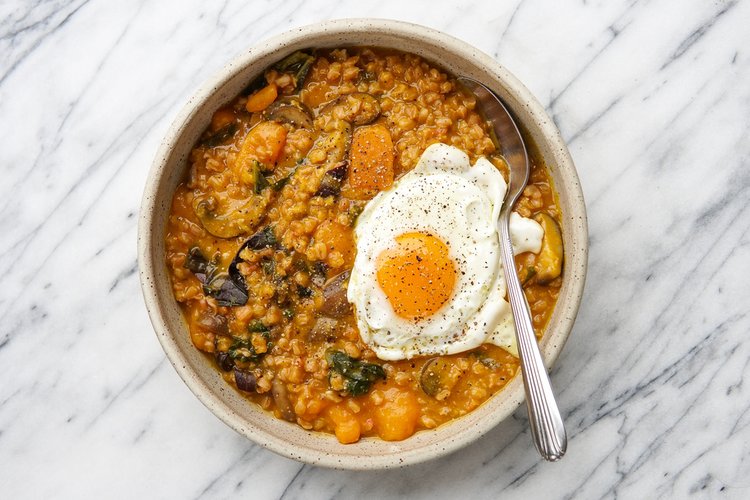
Yet another fat-soluble vitamin that mainly protects our cell membranes from damage/oxidative stress through its antioxidant properties. It’s found in much higher concentrations in our immune cells and plays a role in our T-cell function. (4,5)
Sources:
- Almonds
- Sunflower seeds
- Peanut butter
- Leafy greens
- Avocado
- Olive oil
- Butternut squash
- Fatty fish
Vitamin E-rich recipes:
- Farro, Squash, and Mushroom Stew with Lemon + Ginger
- Chai Spiced Nut and Seed Clusters
- Creamy Garlic Sunflower Pasta
- Seedy Buckwheat Veggie Loaf
- Garlic and Herb Salmon Avocado Melt
- Spinach Avocado Party Dip
- Favorite Granola
Zinc
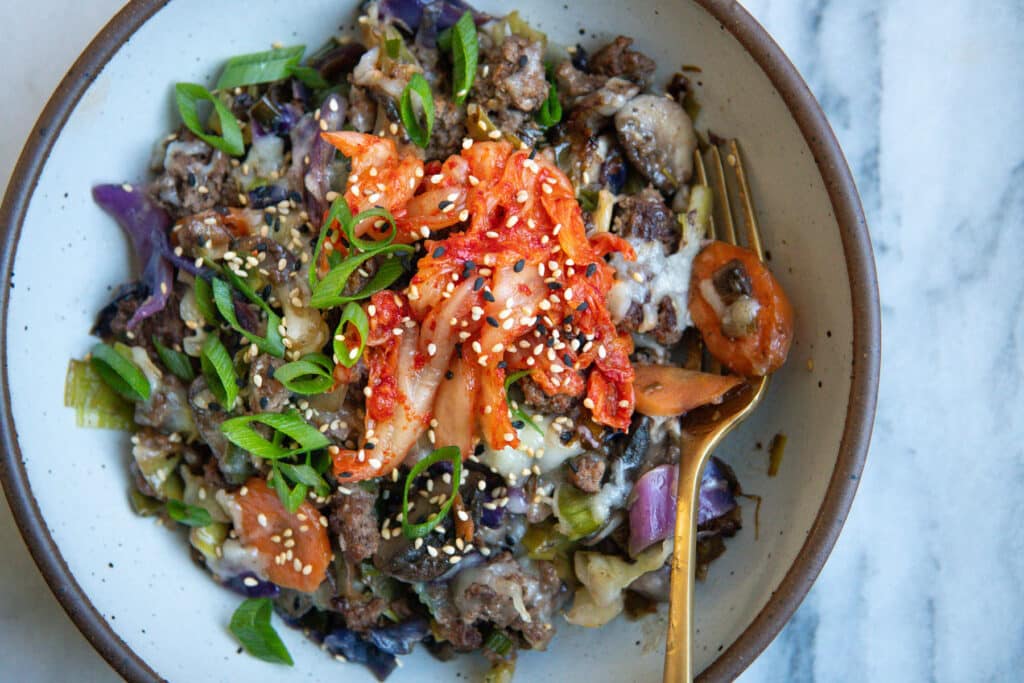
This mighty micronutrient and antioxidant play a key role in immune strength. It’s essential for wound healing and the health of our thymus gland, which is what produces those infection-fighting T cells. Just a mild deficiency in zinc is correlated with lower immune function. (6)
Sources:
- Red meat
- Poultry
- Shellfish
- Beans
- Whole grains
- Nuts
- Pumpkin seeds
- Full-fat dairy
Zinc-rich recipes:
- Burmese Shrimp Curry with Rice Noodles
- Instant Pot Chicken Pho
- Skillet Chicken Beans and Greens with Tomatoes
- Spiced Chicken Beans and Greens Skillet
- Skillet Green Lasagna
- Summer Shrimp and Bean Salad
- Cheesy Kimchi Beef and Veggie Bowls
Selenium
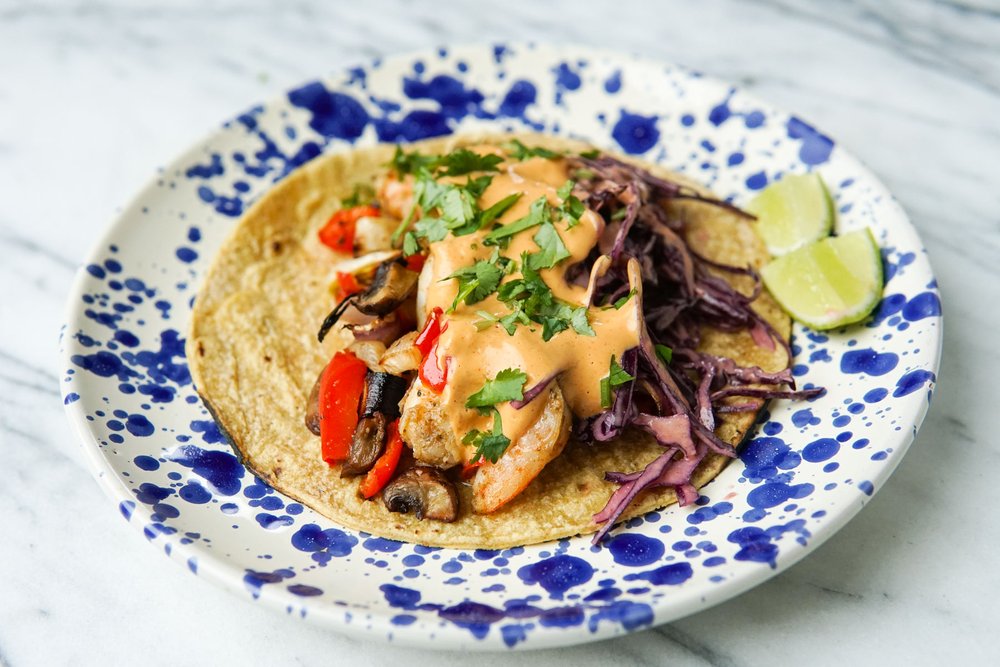
This micronutrient and antioxidant is important for antibody production. It also helps regulate the production of cytokines. (7)
Sources:
- brazil nuts
- cashews
- sunflower seeds
- sesame seeds
- whole grains
- eggs
- seafood
Selenium-rich recipes:
- Strawberry Lemon Balls
- Eggs n’ Greens Anytime Skillet
- Easy Fried Rice with Pickled Things
- Maple Sesame Salmon Noodle Bowls with Spicy Cilantro Sauce
- One-Pot Creamy Tahini Farro and Veggies
- Spiced Shrimp + Veggie Tacos with Smoky Cashew Sauce
Spice up your life!
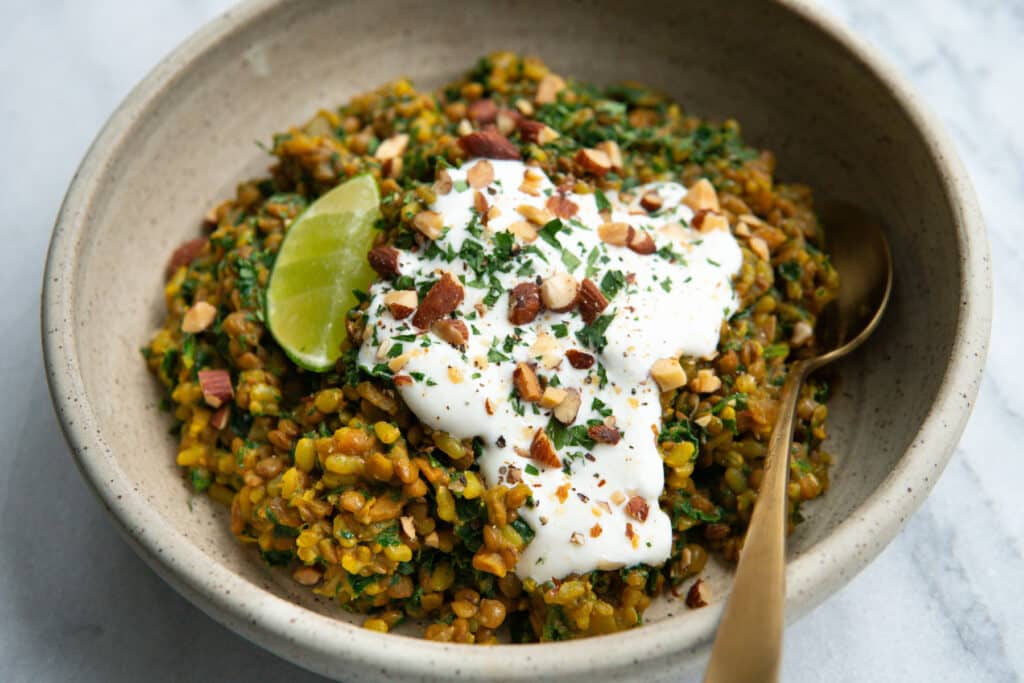
And don’t forget about these immune-boosting spices! Many spices contain phytochemicals, which are compounds produced by plants that can reduce inflammation and fight off free radicals.
- Turmeric
- Ginger
- Garlic
- Cinnamon
- Cardamom
Spiced-up recipes:
- Chicken and Asparagus Miso Curry Stir-Fry
- Spiced Lentils and Rice with Garlicky Yogurt
- Chana Masala with Cucumber Yogurt
- Spiced Lentil Dal with Salted Yogurt
A few other immune boosting tips!
Diet can help to strengthen your immune system, but you also can’t ignore the importance of:
- Stress management: meditation, deep breathing, gratitude, movement, etc…
- Sleep: having an evening routine, avoiding bright lights at night, getting sunlight first thing in the morning, staying off of your phone after a certain time, etc…
- Gut health: around this time of year I try to eat more fermented foods (sauerkraut, kimchi, etc…) and have a stash of bone broth in the freezer to sip on if I’m feeling off.
One other little tip – whenever I travel or feel something coming on, I take this Wellness Formula supplement to get ahead of the game and I swear by it!
The end!
That was a lot of specific information, but when it comes down to it, just do your best to eat with the seasons and include a wide variety of veggies, whole grains, legumes, and protein.
If anything, I hope this blog post gave you some new or old recipes to try this time of year 🙂


leave your comments!